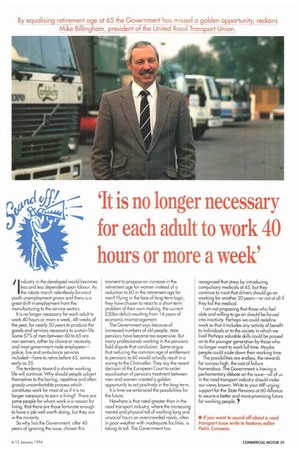'It is no longer necessary
Page 41

If you've noticed an error in this article please click here to report it so we can fix it.
for each adult to work 40 hours or more a week'
/ ndustry in the developed world becomes I less and less dependent upon labour. As the robots march relentlessly forward youth unemployment grows and there is a great shift in employment from the manufacturing to the service sectors. It is no longer necessary for each adult to work 40 hours or more a week, 48 weeks of the year for nearly 50 years to produce the goods and services necessary to sustain life. Some 57% of men between 60 to 65 are non-earners, either by choice or necessity, and most government male employees— police, fire and ambulance services included—have to retire before 65, some as early as 55. The tendency toward a shorter working life will continue. Why should people subject themselves to the boring, repetitive and often grossly uncomfortable process which constitutes work for most of us if it is no longer necessary to earn a living? There are some people for whom work is a reason for living, that there are those fortunate enough to have a job well worth doing, but they are in the minority. So why has the Government, after 40 years of ignoring the issue, chosen this moment to propose an increase in the retirement age for women instead of a reduction to 60 in the retirement age for men? Flying in the face of long-term logic, they have chosen to react to a short-term problem of their own making, the current £50bn deficit resulting from 14 years of economic mismanagement.
The Government says because of increased numbers of old people, state pensions have become too expensive. But many professionals working in the pensions field dispute that conclusion. Some argue that reducing the common age of entitlement to pensions to 60 would actually result in a saving to the Chancellor. They say the recent decision of the European Court to order equalisation of pensions treatment between men and women created a golden opportunity to act positively in the long-term. It is time we embraced the possibilities for the future.
Nowhere is that need greater than in the rood transport industry, where the increasing mental and physical toll of working long and unsocial hours on overcrowded roads, often in poor weather with inadequate facilities, is taking its toll. The Government has recognised that stress by introducing compulsory medicals at 45, but they continue to insist that drivers should go on working for another 20 years—or not at all if they fail the medical.
I am not proposing that those who feel able and willing to go on should be Forced into inactivity. Perhaps we could redefine work so that it includes any activity of benefit to individuals or to the society in which we live? Perhaps valuable skills could be passed on to the younger generation by those who no longer want to work full time. Maybe people could scale down their working time.
The possibilities are endless, the rewards for success high, the cost of failure horrendous. The Government is having a parliamentary debate on the issue—all of us in the road transport industry should make our views known. Write to your MP urging support for the State Pensions at 60 Alliance to secure a better and more promising future for working people. / • if you want to sound off about a rood transport issue write to features editor Patric Cunnane.








































































